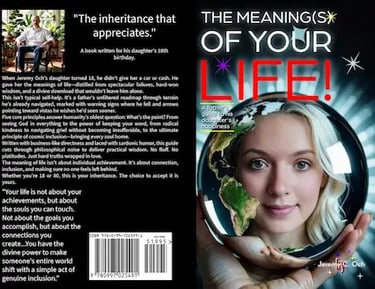Why This Exists


author Jeremy Och
Q: Did your daughter appreciate receiving this?
A: Not even a little.
She either doesn't understand the amount of love conveyed by writing it, or at 18, a book seems lame compared to whatever her friends got for their birthdays. She has some kind of block preventing her from seeing its value right now.
And I knew she would. Before I even finished writing it, I knew she'd stuff it away and pay little attention to it.
Q: Then why write it for her?
A: Because I also know she'll read it later.
Not soon. Not casually. But after a devastating hardship—some enormous loss I can't see yet. In the aftermath of that crisis, she'll come across this book. Maybe while cleaning or moving or just sorting through old things. She'll hold it for the first time with actual curiosity instead of polite disappointment.
And she'll sit down and read the entire thing in one sitting. Everything else in the world will be on pause. Just her and these pages.
That's when it hits its target. That's when it saves her life.
Q: Saves her life? That's a bold claim.
A: I know how it sounds. I told her mother and she looked at me like I'd lost it, so I dropped it.
But I'm not guessing. I know this the same way I knew the principles before I wrote them down. Whether it saves her earthly life or something beyond my human perspective, I can't say. But she will be saved—radically, permanently changed—by reading this book at the exact moment she needs it.
Most folks don't have a freely open avenue with a direct connection to God. I could be wrong about that. But honestly, I'm usually not.
Q: So if it's really written for Bella's future crisis, why publish it publicly?
A: Because there are thousands of other Bellas out there whose crisis already happened. They're in the wreckage right now, today, searching for a reason to keep going.
God doesn't need my marketing strategy to get this book to Bella at the appointed time. But if He commissioned me to write it AND publish it, the public distribution isn't coincidental. There are other appointed times for other people.
My job is removing friction between them and the message.
Q: You keep saying "coincidences don't exist." What does that mean?
A: Exactly what it sounds like.
Coincidences are God's orchestrated attempts at gaining our individual attention. Every circumstance, every moment, every "random" thing that happens—He's vying for your full attention so you'll learn to trust His intentions over your own.
If God's singular focus is bringing all His children home, and He has no other item on His agenda, it stands to reason He'd waste no time or effort on anything that didn't aim at that goal. Right?
Once you see it, you can't unsee it. If you're on this page right now, you didn't find it by accident. He intended you here.
Q: What do you mean God's "singular purpose" is bringing us home?
A: God's motive in everything—every action, every circumstance, every interaction in each of our lives—is inclusion in His kingdom. That's it. Nothing more. Nothing less.
He doesn't cast anyone away, even if they hold onto their own will until their last breath. As long as that last breath is used to surrender to Jesus Christ and let go of everything that preceded that moment, they've arrived. God asks nothing more.
He wants each and every one of us included. The meaning of your life is accepting that invitation.
Q: So what are the five principles?
A: You'll have to read the book for the full breakdown, but here's the foundation:
The first four everyone support the fifth: radical inclusion. When you understand God's fatherly, inexhaustible love—when you trust His will over yours and recognize the impermanence of everything earthly—you're freed from yourself.
Then you're driven by one purpose: including as many souls as possible in God's kingdom through kindness, intention, and living proof that His love is real and available to everyone.
That's the meaning of your life. And mine. And Bella's. And anyone else willing to accept it.
Q: Why does every other book on life's meaning hedge or give frameworks instead of answers?
A: Fear, mostly. Pluralism. The cultural pressure to let everyone "find their own truth."
But if this world is created and intended by God, then our lives exist within His purpose. The meaning isn't negotiable or customizable. It's inherent in what God wants for us: to know Him, feel Him, and willfully surrender our will to His.
searchingI'm comfortable with both. This isn't my message. I'm just the one writing it down.
Q: Who should read this book?
A: Two groups, really.
If you're buying it as a gift: For your daughter, son, friend, or anyone you love—you're planting a seed. It will sit on their shelf until the moment they need it. God will water it when the time comes. Give them something that will matter when it matters most.
If you're in crisis right now: If everything just collapsed and you're searching for a reason to keep going—this is why you found this page. Read it today. It was written for this exact moment.
Q: What happens after someone reads it?
A: They understand the meaning of their life. Not in an abstract, philosophical way. In a concrete, purposeful, "I know exactly why I'm here" way.
For Bella, it will compel her to carry on after devastation. Her grief will be processed and overshadowed by her new purpose: radical inclusion. She'll be driven to effect that in every soul she encounters.
For you? That's between you and God. But if you read this book with an open heart, you won't finish it the same person you were when you started.
Q: Do you realize how audacious all of this sounds?
A: Completely.
People don't just come up with narratives like "God gave me the principles" and "this book will save my daughter's life during a future crisis I can't see yet" out of nowhere. And I'm people. It didn't go down like that.
I'm not asking you to take my word for it. I'm asking you to read the book and decide for yourself whether what's on those pages could've come from anywhere other than God.
If it resonates, you'll know. If it doesn't, I'm just some guy who wrote a book for his daughter and thinks too highly of it.
But you're still here. Still reading. That's not coincidence either.
Q: Where can I get it?
A: Amazon. Right now. Today.


Q: What is this book?
A: The definitive answer to life's meaning. Not a framework. Not a journal prompt asking you to "discover preceded purpose." The actual answer, grounded in what God intended for every single one of us.
It's written as a father's guide to his daughter—but the truth doesn't change based on who's reading it.
Q: Why did you write this?
A: God outlined it. The five principles in this book were given to me directly—shot into my head, if I'm being completely honest about it. I didn't research them or discover them through some personal journey. They arrived fully formed.
He led me through the process of understanding how the first four principles support the fifth: radical inclusion. He knew where they'd lead me. Apparently, He thinks now is the time for this message to get out, and I'm the person to deliver it.
I don't pretend to preceded why me. But I'm certain it wasn't my idea.
Q: Is this really just for fathers and daughters?
A: Written for my daughter Bella. True for everyone.
The principles apply universally—man, woman, child, young adult, doesn't matter. God's purpose for your life isn't gendered or age-gated. But specificity makes it real. If I'd written this "for everyone," it would've been for no one.
The father-daughter frame is the lens, not the limit.